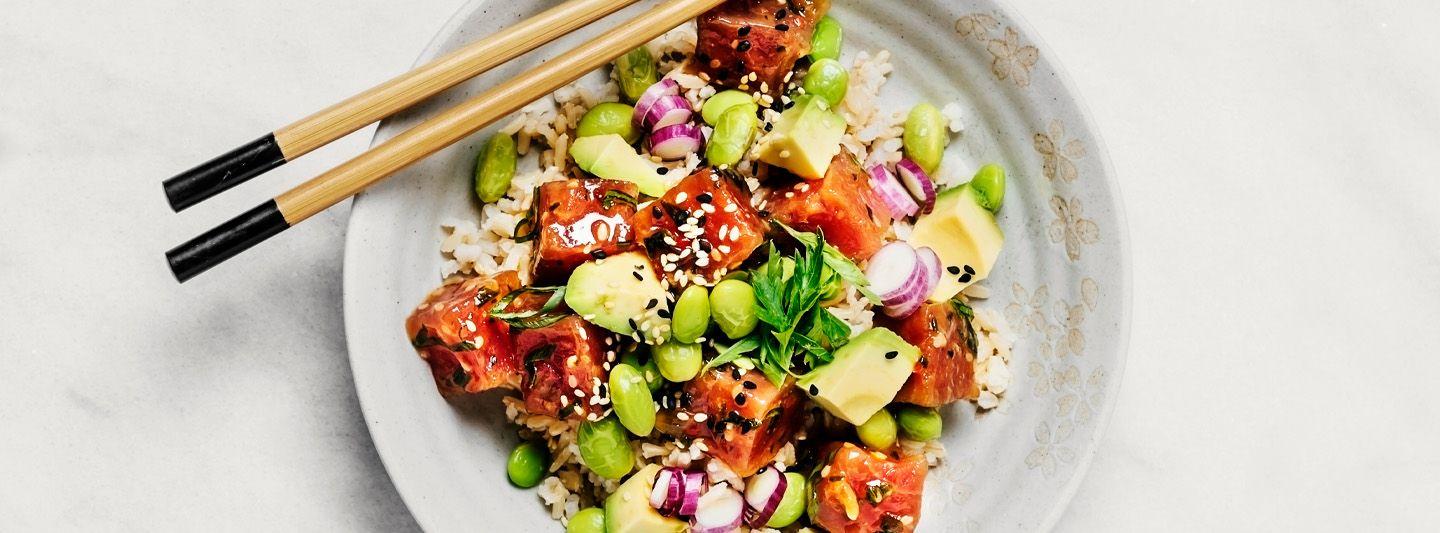Ask a Nutritionist: I have PCOS, what foods should I eat and avoid?
Diet plays a key role in the lifestyle of women with PCOS. Learn more about food choices and the science behind what to eat and what to avoid.
Andrea Givens, MS, RD, CSSD,
Medical Affairs
Sarah Koenck, MS, RD,
Medical Affairs
Published:
March 11, 2025
Read time:
5 minutes

It’s estimated between 50-80% of women with polycystic ovary syndrome (PCOS) have insulin resistance, 1 which means your body can’t easily handle glucose.
Foods to avoid that can exacerbate insulin resistance include sugary drinks and processed foods high in sugar.
Low-glycemic carbs and anti-inflammatory foods are better options if you have PCOS.
Start Lingo today for just $49
Learn how your body responds to food and exercise with a 2-week plan*, no commitment.
Buy now
Question:
I was diagnosed with PCOS a few years ago and have learned that lifestyle factors are important to manage symptoms, especially diet. I’ve seen some conflicting information on what I should avoid (do I need to give up gluten, dairy, and sugar forever?) and what foods to eat (is dietary fat good or bad?). Can you please provide insight? — Christina
Answer:
Dear Christina,
PCOS is an endocrine (hormone) disorder that affects around 10% of women. 1 Among women with PCOS, it’s estimated that between 50-80% have insulin resistance. 2 Insulin is a hormone that acts on glucose in the body.
Insulin resistance is when cells in your muscles, fat, and liver don't respond well to insulin and can't easily take up glucose from your blood. As a result, your pancreas makes more insulin to help glucose enter your cells. 3 Insulin resistance can result in inflammation, blood vessel damage, and high glucose levels (hyperglycemia), and more than half of women with PCOS develop type 2 diabetes by age 40. 4
While there is no treatment for PCOS, you’re right in that lifestyle can have a major impact on insulin resistance and other symptoms of PCOS. According to clinical studies in women with PCOS, making diet changes brought positive results in terms of clinical appearance of the syndrome, specifically weight loss and body composition, as well as improving insulin resistance and lowering testosterone (a hormone that’s elevated in women with PCOS). 5
So, you’re already ahead of the game in reevaluating your diet with PCOS. Making intentional food choices, especially when it comes to carbs, can help manage symptoms caused by insulin resistance. I know there’s a lot of conflicting information out there, and there’s still so much that’s misunderstood about PCOS. However, after combing through the research, I’ve outlined my best tips on how to navigate your food choices with PCOS.
Foods to eat with PCOS
Prioritize protein
In a long-term study in women with PCOS, significant improvements were observed when sugar and starchy carbohydrates in the diet were replaced with vegetables, fruits, nuts, and a daily protein intake of 0.7 grams (g) of protein per pound of body weight. Protein sources focused on meat, eggs, fish, and dairy products due to the higher carb content of plant-based proteins like beans and legumes. After just 6 months, the women experienced significant decreases in glucose, body weight, and body fat. 6
Put it into practice: Ensure all your meals and snacks are built around plenty of protein. Especially your first meal of the day, when you break the overnight fast. Starting your day with a protein-rich breakfast like eggs, Greek yogurt, or a high-protein smoothie that won’t cause a huge glucose (or insulin) rush will set you up to feel your best. Aim for at least 30 g of protein per meal.
Fuel with healthy fats
Foods like walnuts, chia seeds, flaxseeds, olive oil, and fatty fish are beneficial in multiple ways. Not only do they not cause a glucose spike, but they also contain anti-inflammatory compounds, which work to reduce pro-inflammatory pathways in the body. 7 In a study where women with PCOS were provided a Mediterranean-inspired low glycemic load anti-inflammatory diet (including 40 g of flaxseeds a day), after 12 weeks they had significant improvements in body composition, hormones and menstrual cycles, blood pressure, glucose homeostasis, dyslipidemia, and markers of heart disease risk. 7
Put it into practice: Add a source of healthy fats to every meal. Top salads with walnuts or chia seeds, make your own salad dressing with olive oil and lemon juice or vinegar, or add salmon or tuna to your lunches.
Low-glycemic carbs
Green leafy vegetables, berries, and whole grains are nutrient- and fiber-rich options that provide some carbohydrates, but are digested much slower, allowing insulin to work more effectively and reduce the chances of a spike. Carbs like pasta, rice, or potatoes can be cooked, cooled, and reheated to create resistant starch that will have less impact on glucose and insulin. 8 It can also be helpful to eat these types of carbs last as part of a balanced meal with vegetables, protein, and healthy fats to help reduce the glucose and insulin response when eating higher carb foods. 9
Put it into practice: Start your meals with non-starchy veggies and protein and save the carbs for last. Cook rice at the beginning of the week and cool it before reheating for lunches or dinners throughout the week. Choose berries and cream rather than cake or cookies when reaching for something sweet.
Foods to avoid with PCOS
It’s important to note that you don’t need to give up any type of food forever (unless you’re allergic!). A healthy eating plan should include some of your favorite treats in moderation, so you don’t feel deprived and aren’t tempted to overeat down the road. That said, there are some foods that can exacerbate PCOS symptoms and are best to eat less often.
Carbs disguised as protein
Breaded and fried foods like fish sticks or chicken tenders have less protein than you think and are laden with carbs and unhealthy fats not great for glucose or PCOS. Reduce how many fried foods you eat as they can contribute to inflammation, and fried meats in particular have been shown to impair glucose homeostasis. 10
Put it into practice: Swap out breaded meats for grilled meats and look for words like roasted, grilled, baked, steamed, or broiled on menus when eating out (avoid: crispy, crunchy, or battered).
Ultra-processed foods high in fat and sugar
Women with PCOS may be more susceptible to the psychologically rewarding intake of ultra-processed foods, increasing the risk to consume them in addictive-like ways and lead to weight gain, inflammation, and metabolic issues like altered glucose control. 11
Put it into practice: Pick whole foods that are minimally processed over ultra-processed foods. For example, instead of chips or pretzels for a snack, try an apple with almond butter or roasted and salted edamame beans.
Sugary beverages and high-glycemic carbs
Foods with added sugars like soda and other sugar-sweetened beverages, bakery goods like cakes, cookies, and candies, and high-glycemic carbs like breakfast cereals, oat milk, and white bread provide a large glycemic load, which further perpetuates insulin resistance. Limiting sugar, refined carbohydrates, and high-glycemic carbs can help manage insulin levels effectively. 12
Put it into practice: Limit these foods as much as possible, and if eating them occasionally, consume with or after a balanced meal centered around protein, vegetables, and healthy fats.
What about gluten and dairy?
Although there is some discussion online about if women with PCOS should avoid gluten and dairy specifically, there isn’t research to support this claim.
However, you may choose to avoid these food groups if you notice they cause you unpleasant symptoms such as GI distress. It’s best to speak with a qualified healthcare provider, such as a registered dietitian nutritionist or doctor, to discuss a more personalized nutrition plan.
A final note from Lingo
While there is no cure for PCOS, symptoms can be managed by following the guidance provided here on dietary choices, including foods to eat and those to limit. Keep in mind that this article is for informational purposes only and not a substitute for medical advice.
Additionally, using a continuous glucose monitor (CGM) like Lingo can add valuable insights into how your dietary and lifestyle choices are impacting your glucose levels, which are closely related to insulin. It’s important to consult with your healthcare provider about your individual needs.
— Andrea Givens, Registered Dietitian and Nutritionist
The Lingo Glucose System is intended for users 18 years and older not on insulin. It is NOT intended for diagnosis of diseases, including diabetes.
The Lingo program does not guarantee that everyone will achieve the same results as individual responses may vary. Consult your healthcare professional before making changes to your diet or exercise regimen or if you have an eating disorder or a history of eating disorders.
© 2025 Abbott. All rights reserved. The biosensor shape and appearance, Lingo, and related brand marks are marks and/or designs of the Abbott group of companies in various territories. Other marks are the property of their respective owners.
ALB-02312
Published:
March 11, 2025
Read time:
5 minutes


Andrea Givens, MS, RD, CSSD, is a Senior Medical Affairs Specialist and Health Coach at Lingo. Andrea has a passion for empowering individuals to leverage their unique physiology to optimize performance and health. She’s been a registered dietitian since 2010 and has been a board-certified specialist in sports dietetics since 2017. She holds master's degrees in both nutrition science and exercise physiology from San Diego State University.


Sarah Koenck, MS, RD, is a Medical Affairs Specialist at Lingo. She’s been a registered dietitian since 2011 and has a master's degree in kinesiology from A.T. Still University. She spent the first part of her career as a clinical dietitian in the ICU before moving onto specializing in diabetes and weight management in the digital health space. Her personal health journey, including living with type 1 diabetes for almost 30 years and wearing a continuous glucose monitor for almost 20, has driven her commitment to help others at Lingo.
A healthy choice for your inbox
Sign up for Lingo emails to get science-backed tips, special offers, and The Journey Newsletter.
Start Lingo today
for just $49
Learn how your body responds to food and exercise with a 2-week plan*, no commitment.
- 1 Lingo biosensor with minute-by-minute glucose monitoring.
- Full access to the Lingo app.
- Available over the counter. No prescription needed.
- Works with iOS and AndroidTM
Shop now
Free shipping | 30-day money-back guarantee†
*No commitment. This plan does not auto-renew.
†30-day money-back guarantee is for first time purchases only

